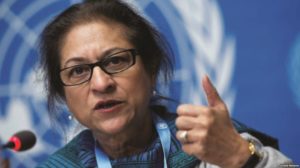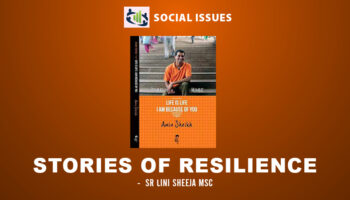When she was leading the agitation, she was not aware that the police had been strictly ordered to disrobe her and have her photographed. The ruthless dictator and the extremists thought that kind of humiliation would silence her. The unscrupulous policemen standing behind her did try to tear her dress off and managed to bare her back. But her supporters fought and succeeded in protecting her from further humiliation. But the outrage and the shock did not silence her. Asma Jahangir, described as the “gutsiest woman of Pakistan,” fought courageously against dictatorship and religious extremism till the end that came on 11 February this year.
Born on 27 January 1952 into an affluent family in Lahore, Pakistan, Asma Jilani Jahangir studied at the Convent of Jesus and Mary, Lahore. In 1978 she received her law degree from Punjab University, Lahore. Right from her childhood Asma was exposed to activism and political struggle. Her father, Malik Ghulam Jilani, though a civil servant, was a fearless activist who was frequently jailed for opposing military dictators. In fact, the first time Asma appeared in court was to plead the case of her jailed father.
In 1983, Safia Bibi, a blind 13-year-old girl, was raped by her employers, and as a result became pregnant. But what happened to her can enlighten you about what really goes on in Pakistan. Her rapists accused her of ‘fornication’ and the court fined her and sentenced her to flogging and three years of imprisonment. Asma and a group of supporters staged a protest and later she defended Safia in the court. Widespread protests and pressure finally made the appeals court overturn the infamous verdict that sought to punish the victim of the crime.

Asma advocated peace with India, and so the extremist elements often accused her of being an Indian agent or a traitor.
She worked initially at the Lahore High Court, and later at the Supreme Court. In the 1980s, when she became active in the Movement for the Restoration of Democracy, the regime of Zia-ul-Haq put her in jail. In 1986, she moved to Geneva, and became the vice-chair of the Defence for Children International. In 1988 she returned to Pakistan. She co-founded the Human Rights Commission of Pakistan and was its Secretary General for a few years. Asma became Pakistan’s first woman to serve as the President of Supreme Court Bar Association. She served as the United Nations Special Rapporteur on Freedom of Religion for six years from 2004 and on the U.N. panel for inquiry into human rights violations in Sri Lanka, Israel and Iran.
Asma spent her life defending the human and women’s rights, rights of religious minorities and children in Pakistan. She was a staunch critic of the Hudood Ordinance that decreed that victims of rape had to prove their innocence or else face punishment themselves. She also fought against efforts to bring in Proposed Law of Evidence, which reduced the value of a woman’s testimony to half of the value of a man’s testimony. In a letter to The New York Times, Asma said that “Women are arrested, raped and sexually assaulted every day in the presence of female constables, who find themselves helpless in such situations.” She had to pay dearly for criticizing Pakistan’s notorious blasphemy laws that were used against the minorities.
She won a number of awards, including the Ramon Magsaysay Award and the French government’s ‘Officier de la Légion d’honneur’ award. But the international recognition of her courage and struggles did not prevent the Pakistani government and army from harassing her. If she was not jailed, she was put under house arrest. In 2012, she came to know that an assassination plot against her had been hatched at the highest level of the security establishment. But she refused to leave the country. She said, “I will not leave. My ancestors are buried here, and my life is here.”
That life ended on 11 February 2018, when she suffered a brain hemorrhage. Writing about her funeral on 13 February, Rabia Mehmood, a Pakistani woman journalist, said, “it turned into a poignant display of women’s resistance in Pakistan… Her funeral was a staggering manifestation of her legacy, a radical send-off befitting a feminist icon. It was subversive not only because thousands of men and women stood next to each other praying, but also because those men and women were Christians, Sikhs, Shia, Sunni and Ahmadi.”

To subscribe to the magazine Contact Us





